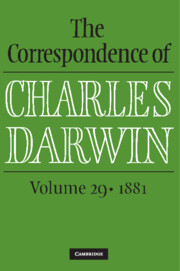Refine search
Actions for selected content:
10303 results in History of science: general interest
Frontmatter
-
- Book:
- The Correspondence of Charles Darwin
- Published online:
- 24 June 2022
- Print publication:
- 07 July 2022, pp vi-vi
-
- Chapter
- Export citation
Index
-
- Book:
- The Correspondence of Charles Darwin
- Published online:
- 24 June 2022
- Print publication:
- 07 July 2022, pp 909-976
-
- Chapter
- Export citation
Appendix V - Reviews of Earthworms
-
- Book:
- The Correspondence of Charles Darwin
- Published online:
- 24 June 2022
- Print publication:
- 07 July 2022, pp 705-709
-
- Chapter
- Export citation
Frontispiece
-
- Book:
- The Correspondence of Charles Darwin
- Published online:
- 24 June 2022
- Print publication:
- 07 July 2022, pp 1-2
-
- Chapter
- Export citation
Calendar List of Letters
-
- Book:
- The Correspondence of Charles Darwin
- Published online:
- 24 June 2022
- Print publication:
- 07 July 2022, pp ix-xvi
-
- Chapter
- Export citation
Dedication
-
- Book:
- The Correspondence of Charles Darwin
- Published online:
- 24 June 2022
- Print publication:
- 07 July 2022, pp v-v
-
- Chapter
- Export citation
Introduction
-
- Book:
- The Correspondence of Charles Darwin
- Published online:
- 24 June 2022
- Print publication:
- 07 July 2022, pp xvii-xxxii
-
- Chapter
- Export citation
Appendix IV - Presentation list for Earthworms
-
- Book:
- The Correspondence of Charles Darwin
- Published online:
- 24 June 2022
- Print publication:
- 07 July 2022, pp 701-704
-
- Chapter
- Export citation
Illustrations
-
- Book:
- The Correspondence of Charles Darwin
- Published online:
- 24 June 2022
- Print publication:
- 07 July 2022, pp viii-viii
-
- Chapter
- Export citation
Provenances
-
- Book:
- The Correspondence of Charles Darwin
- Published online:
- 24 June 2022
- Print publication:
- 07 July 2022, pp xxxvii-xxxix
-
- Chapter
- Export citation
Frontmatter
-
- Book:
- The Correspondence of Charles Darwin
- Published online:
- 24 June 2022
- Print publication:
- 07 July 2022, pp i-iv
-
- Chapter
- Export citation
Biographical Register
-
- Book:
- The Correspondence of Charles Darwin
- Published online:
- 24 June 2022
- Print publication:
- 07 July 2022, pp 731-856
-
- Chapter
- Export citation
Notes on Manuscript Sources
-
- Book:
- The Correspondence of Charles Darwin
- Published online:
- 24 June 2022
- Print publication:
- 07 July 2022, pp 906-908
-
- Chapter
- Export citation
Abbreviations
-
- Book:
- The Correspondence of Charles Darwin
- Published online:
- 24 June 2022
- Print publication:
- 07 July 2022, pp xlviii-xlviii
-
- Chapter
- Export citation
Appendix II - Chronology 1881
-
- Book:
- The Correspondence of Charles Darwin
- Published online:
- 24 June 2022
- Print publication:
- 07 July 2022, pp 697-699
-
- Chapter
- Export citation
Contents
-
- Book:
- The Correspondence of Charles Darwin
- Published online:
- 24 June 2022
- Print publication:
- 07 July 2022, pp vii-vii
-
- Chapter
- Export citation
A Note on Editorial Policy
-
- Book:
- The Correspondence of Charles Darwin
- Published online:
- 24 June 2022
- Print publication:
- 07 July 2022, pp xl-xlv
-
- Chapter
- Export citation
The Correspondence of Charles Darwin 1881
-
- Book:
- The Correspondence of Charles Darwin
- Published online:
- 24 June 2022
- Print publication:
- 07 July 2022, pp 1-636
-
- Chapter
- Export citation
Bibliography
-
- Book:
- The Correspondence of Charles Darwin
- Published online:
- 24 June 2022
- Print publication:
- 07 July 2022, pp 857-905
-
- Chapter
- Export citation

The Correspondence of Charles Darwin
-
- Published online:
- 24 June 2022
- Print publication:
- 07 July 2022
